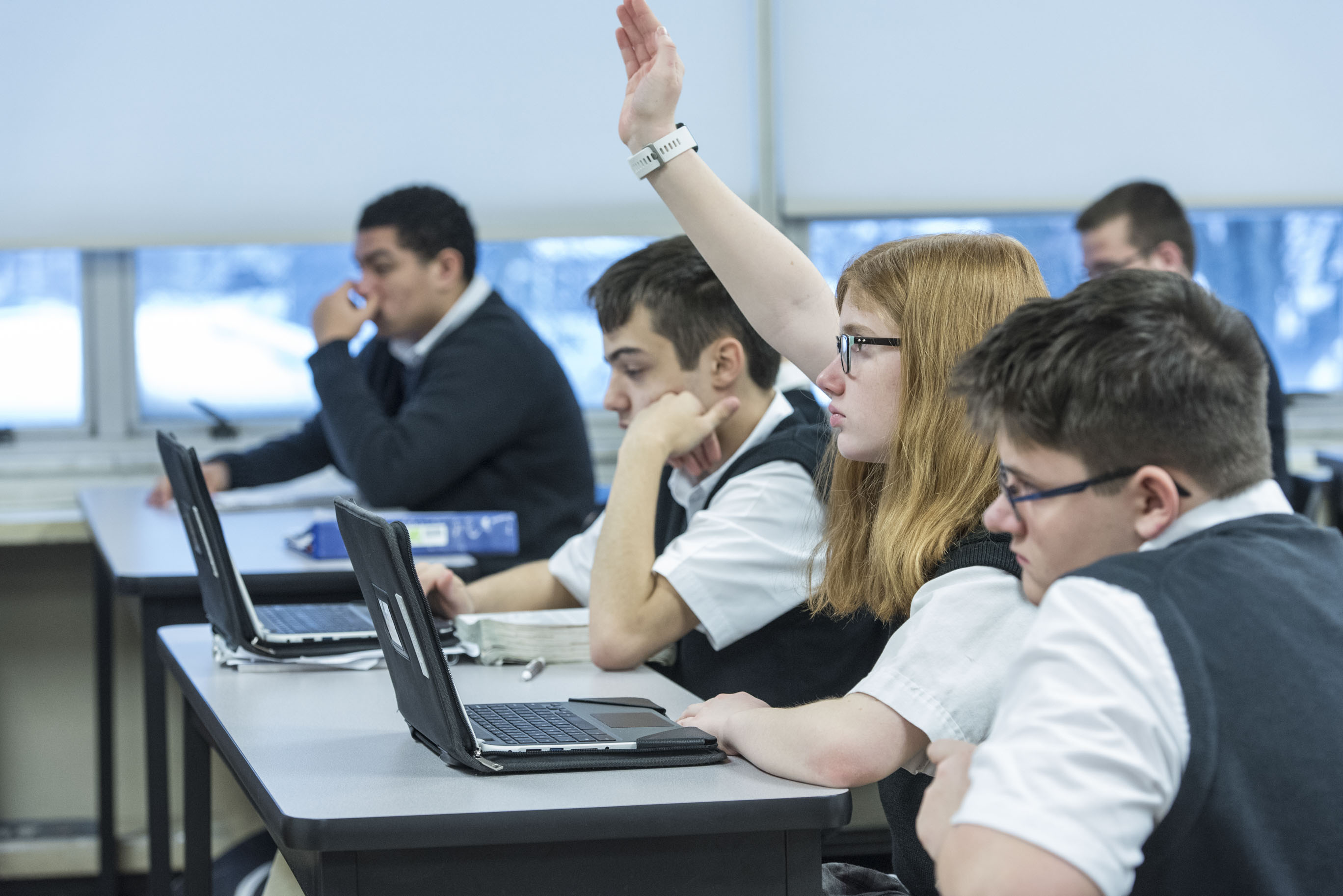Kelly Kendro returned to alma mater, other archdiocesan schools for study on students’ perceptions of hard work, fairness and opportunity
MADISON HEIGHTS — A year ago, Kelly Kendro, a lab coordinator in the psychology department at the University of California San Diego, had an idea to add an interesting dimension to an ongoing research project by including Catholic school students in the study.
And not just any Catholic school students, but students in the Archdiocese of Detroit.
The project compares students in India and the U.S. to explore how their beliefs about hard work, fairness in society and opportunities for success differ. The “Growth Mindset” study is being done by members of the UC San Diego psychology department.
Kendro observed that Catholic school students are often underrepresented in psychology research, in part because of researchers’ limited access to parochial schools. She knew first-hand that a Catholic education shapes one’s values and worldviews differently than public or other non-religious education; Kendro attended Catholic schools from kindergarten through 12th grade, first at St. Anne School in Warren and then at Bishop Foley High School in Madison Heights.
After graduating from Bishop Foley in 2015, Kendro earned bachelor’s degrees in cognitive science and romance languages from the University of Michigan before taking the job in the Language and Development Lab at UC San Diego.

Because of her own positive experience with Catholic schools, Kendro proposed the idea of studying Catholic school students to her colleagues. Project leaders Haleh Yazdi, Dr. David Barner and Dr. Gail Heyman were open to it.
Kendro reached out to her former Bishop Foley French teacher, May Bluestein, Ph.D., who is now assistant superintendent for curriculum, instruction and assessment for Catholic schools in the Archdiocese of Detroit, and the archdiocese gave the green light for Kendro to work with archdiocesan schools.
“I really wanted to highlight our Catholic schools and ‘show them off.’ In my mind, I think these students might have very different responses than students in a public school setting,” Kendro said. “This data will allow us to see how the religious context and the emphasis on parts of the curriculum shapes students’ views of the world.”
Last March, Kendro traveled back home to Michigan to conduct research at her former schools, St. Anne and Bishop Foley, as well as Guardian Angels School in Clawson and St. Catherine of Siena Academy in Wixom.
Kendro visited each school and, with parent consent, administered a written survey to students, asking them to rank statements such as, “I can always change my personality and talent if I work hard.” One hundred and fifty students in fifth, seventh and ninth grades received surveys before Kendro’s in-person research ended prematurely because of the COVID-19 pandemic.
Frank Accavitti, principal of Bishop Foley, said he wasn’t surprised to get an email from Kendro asking to visit her alma mater.
“We use the term ‘Foley Family,’ and it’s not just a catch phrase,” Accavitti said. “From the first moment students are accepted to the school, they’re a part of it. The students, the parents, the staff are a united group that’s there for one another. So for Kelly, it’s never that she ‘comes back’ to the Foley Family; it’s that she never left it.”

That sense of community is exactly why Kendro theorizes that Catholic school students will produce unique results in research.
“The community mentality of Catholic schools was so valuable to me. I formed very strong connections with my teachers and could feel that support from the other families and the school community during my formative years,” Kendro said.
Accavitti came to Bishop Foley as vice principal when Kendro was a senior at the school. He recalls her being an excellent student and was pleased to learn she would include Catholic schools in the data set representing students from the United States.
“I think because of the commitment made by Catholic school students and their families — both to the financial aspect and to the codes of conduct — there’s a strong work ethic right from the beginning,” Accavitti said. “It makes a difference when you go about your day with the knowledge that you’re a beloved son or daughter of Christ, and we try to provide that foundation for students.”
Kendro is still seeking additional fourth- and eighth-grade students to complete the survey, which is now available online. She and her colleagues hope to complete the study this year. Following the submission and review process, they will publish their findings in 2022, which will be shared with Archdiocese of Detroit schools as an aid for improving educational practices.
“I’m interested in reading the results of this study and sharing them with our administrators and teachers,” Bluestein told Detroit Catholic. “(The study) is focused on adolescents and how they perceive growth mindset, fairness in the world, and purpose for learning beyond whether the outcome is fair or not, which can all have an impact on our students’ learning and growth.”
Kendro is proud to know that future research will be formed by this study, with the hope that Catholic school students will regularly be part of developmental, social and emotional literature in psychological research.
Participate in the survey
If you are the parent or guardian of a fourth- through eighth-grade student in a Catholic school within the Archdiocese of Detroit who would like to participate in the 25-question online survey, go to http://ladlab.com/survey.









